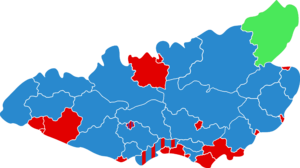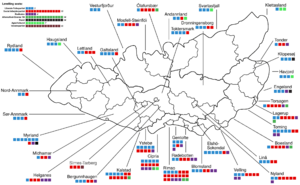2021 Scovernois federal election
| June 15, 2021 | |||||||||||||||||||||||||||||||||||||||||
All 318 seats of the Rigsdagen 160 seats needed for a majority | |||||||||||||||||||||||||||||||||||||||||
|---|---|---|---|---|---|---|---|---|---|---|---|---|---|---|---|---|---|---|---|---|---|---|---|---|---|---|---|---|---|---|---|---|---|---|---|---|---|---|---|---|---|
| Turnout | 78.35% ( | ||||||||||||||||||||||||||||||||||||||||
This lists parties that won seats. See the complete results below. | |||||||||||||||||||||||||||||||||||||||||
| |||||||||||||||||||||||||||||||||||||||||
The 2021 Scovernois federal election wase held on June 15, 2021, to elect all 318 members of the Rigsdagen, and indirectly the next Premier of Scovern.
250 members were directly elected by their constituencies using party-list proportional representation, while an addition 68 members were elected via levelling seats in order to better represent the national vote shares in the Rigsdagen. The Liberal People's Party remained the largest party in the Rigsdagen with 110 seats, shortly followed by the Social Labour Party on 106 seats, who gained 14 seats since their blow-out in the 2017 election. The Radicals under Melkolm Jorn Højkirke were ultimately kingmakers with 37 seats. On October 15, 2021, the LFP successfully negotiated a coalition deal with the Radicals, continuing the "Lavender coalition" with Ine-Linda Nesby remaining as premier.
Background
In the 2017 Scovernois federal election, the SAP, who were seeking re-election under leader Sebastian Bertelsen, returned a historically low result in the wake of the 2017-18 Scovernois tax scandal, which alienated a lot of the party's vote. The main beneficiaries of this vote were the Radicals, whose socially liberal administration under Melkolm Jørn Højkirke took much of the progressive vote from the SAP, especially in urban areas.
In cities such as Sirnes-Tarberg, which still held a large left-wing labour movement, the SAP vote dissipated to both the Left Party, who equalled the SAP in seats in the city, and Frem, whose populist and anti-corruption rhetoric as well as an explicit focus on local issues in the city scored them a large seat boost.
The Radicals entered government with Ine-Linda Nesby's LFP under a coalition agreement in 2017. Governing in a notably more liberal way than the LFP's predecessor government, it achieved many progressive and liberal reforms, mainly pushed by the Radicals, including gender self-identification and the legalisation of recreational marijuana. The government partially drew the ire of the LFP's more conservative factions, some of which defected to Frem. The government, while technically a minority government, entered an informal confidence and supply agreement with Agrarforbund after the defections in 2018. For most of Nesby's tenure, the government has held 158 of 318 seats in the legislature, just two short of a majority.
Electoral system
Elections in Scovern are conducted using open-list proportional representation with the Boeri method in 38 constituencies across the nation. Seat numbers vary by constituency. 250 seats are directly elected, with an additional 68 leveling seats distributed using a national list vote. The levelling seats aim to make the composition of the Rigsdagen more proportional to vote counts.
The threshold for election is 4%, so parties represented in the Rigsdagen always carry at least 13 seats.
Elections are always held every four years, regardless of snap elections.
Political parties
The Liberal People's Party (LFP; Liberale Folkepartiet) are the largest party in the Rigsdagen, with 111 of 318 seats. It is the largest party in the current coalition government and the First Nesby cabinet, supplying both premier Ine-Linda Nesby and foreign minister Hans Aage Ohlsen. Coming off one of its best electoral results in recent memory, owing both to Nesby's own popularity as well as the 2016-17 Scovernois tax scandal, the party will likely look to re-enter government under another coalition agreement.
The Social Labour Party (SAP; Social Arbejderpartiet) are the second-largest party in the Rigsdagen, with 89 seats. After the 2016-17 tax scandal significantly affected the party's showing in the 2017 Scovernois federal election, the party under the new leadership of Armela Viram Srimathi gutted much of its old centrist wing, many of whom were involved in the scandal. The SAP sport one of Scovern's youngest prospective cabinets, but will likely also require a significant coalition partner to enter government. The Alternative–Greens '89, the Radicals, Agrarforbund and the Left Party could all emerge as potential coalition partners for the SAP. Policy-wise, Srimathi attempted to pivot towards environmentalist policies, but upon backlash in cities such as Sirnes-Tarberg, attempted to reconcile the vote with the adoption of prospective "Buy Euclean" policy, which has been adopted elsewhere in Euclea.
The Radicals (R. or Rad., Radikale) are the Rigsdagen's third-largest party with 47 seats, as well as the junior partner in the incumbent Lavender coalition[note 1] that have governed since 2017. Under leader Melkolm Jørn Højkirke, the Radicals were led to their best post-war electoral result by garnering a huge chunk of the SAP's progressive voterbase, and negotiated several significant social liberal concessions, including the legalisation of recreational marijuana and gender self-identification. Both passed the Rigsdagen in 2019, causing three LFP RMs to defect to Frem.
The Alternative–Greens '89 (A-G89; Alternativet–Grønne'89) are the fourth-largest party in the Rigsdagen and the largest of its four minor parties, with 22 seats. In 2017, the party refused to enter government with the SAP in wake of its scandal, but new leadership in the SAP and Greens have sought to reconcile this relationship. The prospect of coalition with the SAP is thought to be one of the reasons Srimathi has adopted more environmentalist and green policies, though it is likely Brøndum and the Greens will demand more in concessions if they are to enter government.
Frem (F.) have 18 seats in the Rigsdagen, and generally ran on a right-wing populist, anti-corruption and anti-establishment agenda in the 2017 election, also picking up some of the SAP's old industrial voterbase. Though it is the second-largest of the four minor parties, all six of the other parties agree to exclude Frem from any potential governing forming, including on sub-national levels. The party, its leader Jimmy Bruun, and its members have come under heavy scrutiny before for comments made both during and outside of the political process.
The Agrarian League (Af; Agrarforbund) is an agrarian, centrist party, with 15 seats in the Rigsdagen. The majority of Af's support come from Frelland, but they see limited support in rural Mesconia and Vestelia. The party also puts some focus on local issues. They generally provide informal supply and confidence to incumbent governments, but rarely are included in the government itself. It is currently led by Vestelian Lars Jan Torbjørn Skauge.
The Left Party (VP; Venstrepartiet) is the smallest of the represented parties, with 13 seats in the Rigsdagen. The party espouses socialism and soft Eucloscepticism, and sees almost all of its popularity in old post-industrial regions. Its leader Kathrin Bendixen has said she is open to a coalition with the SAP, but the VP's concession demands are likely to conflict with the Greens.
Endorsements
Newspapers and media outlets
Nationwide publications
| Publication | Ownership | Endorsement | Comments | |
|---|---|---|---|---|
| Dagbladet Forretning | Mediacentre | Liberal People's Party | ||
| Dagbladet Kiprien | SNPC/Brandt Group | Radicals | Dagbladet Kiprien switched from endorsing the LFP from 2005–17. | |
| Dagligeversler | Mediacentre | Social Labour Party | ||
| Den Nye Verden | SNPC/Brandt Group | Social Labour Party | ||
| Håndværkeren | Berg-Jensen Media | Liberal People's Party | ||
| N.o.A. | Berg-Jensen Media | Liberal People's Party | ||
| Politisk | Politisk | No endorsement | Politisk continued their trend of political neutrality. | |
| Statsmand | Mediacentre | Liberal People's Party | ||
Individuals
Liberal People's Party
Social Labour Party
- Lissie Albertsen, journalist
- Sofija Anasdohter, Azmaran politician and incumbent Thingspeaker of Azmara[1]
- Anne Espersen, TV personality and presenter
- Monique Degar-Abdulrashid, Gaullican politician and incumbent President of Gaullica, former Premier of Gaullica.
- Zoe Halivar, Estmerish politician and incumbent Prime Minister of Estmere[2]
- Kasper Hviid, journalist
- Stig Jørgensen, member of Moonrocks
- Rasmus Krogh, journalist
- Fritz Martinsen, member of Moonrocks
- Elena Rohde, musician
- Jean Vallette, former Gaullican President and Premier.
- Arne Villumsen
- Bonne Zijlstra, Alslandic politician and former President of the Euclean Community
- Rupert van Bleiswijk, incumbent Premier of Hennehouwe
Radicals
- Robert Bentsen, TV personality
- Neðanjarðar, electronic band
- Niels Overgaard, journalist
The Alternative–Greens '89
- Marius Martinsen, member of Moonrocks
- Jim Nielsen, member of Moonrocks
- Yoneno Yuuko, musician
- Bart van Veen, co-leader of the Hennish Green Party
- Lise Xi, co-leader of the Hennish Green Party
Frem
Agrarforbund
- Sharon Visscher, co-leader of the Hennish Agrarian–Farmer's Party
Left Party
Results
| Party | Votes | % | Seats won | List seats | Total seats | +/- | ||
|---|---|---|---|---|---|---|---|---|
| Liberal People's Party | LFP | 5,144,824 | 34.76% | 107 | 3 | 110 | -4 | |
| Social Labour Party | SAP | 4,915,409 | 33.21% | 92 | 13 | 105 | +16 | |
| Radicals | Rad. | 1,745,036 | 11.79% | 33 | 4 | 37 | -10 | |
| The Alternative–Greens '89 | A-G89 | 982,786 | 6.64% | 7 | 14 | 21 | -1 | |
| Frem | FREM | 771,131 | 5.21% | 3 | 14 | 17 | -1 | |
| Agrarforbund | Af | 666,044 | 4.50% | 7 | 7 | 14 | -1 | |
| Left Party | VP | 663,084 | 4.49% | 1 | 13 | 14 | +1 | |
By constituency
|
| ||||||||||||||||||||||||||||||||||||||||||||||||||||||||||||||||||||||||||||||||||||||||||||||||||||||||||||||||||||||||||||||||||||||||||||||||||||||||||||||||||||||||||||||||||||||||||||||||||||||||||||||||||||||||||||||||||||||||||||||||||||||||||||||||||||||||||||||||||||||||||||||||||||||||||||||||||||||||||||||||||||||||||||||||||||||||||||||||||||||||||||||||||||||||||||||||||||||||||||||||||||||||||||||||||||||||||||||||||||||||||||||||||||||||||||||||||||||||||||||||||||||||||||||||||||||||||||||||||||||||||||||||||||||||||||||||||||||||||||||||||||||||||||||||||||||||||||||||||||||||||||||||||||||||||||||||||||||||||||||||||||||||||||||||||||||||||||||||||||||||||||||||||||||||||||||||||||||||||||||||||||||||||||||||||||||||||||||||||||||||||||||||||||||||||||
Government formation
After the elections, LFP leader Ine-Linda Nesby was the first to be formally invited by the speaker to form government as the largest party by seat share. After initial optimism, talks to reinstitute the ruling Lavender coalition fell through and Nesby's first proposed government failed its investiture vote by a margin of 84. On October 1, Armela Viram Srimathi of the SAP was invited to begin government negotiations. Failed negotiations with the Radicals led to a large rejection of Srimathi's proposed cabinet on October 12. Following the second investiture vote, the LFP and the Radicals agreed on a deal in principle, with confidence and supply from the Agrarian League, and the government was successfully invested on October 15.
|
|
| |||||||||||||||||||||||||||||||||||||||||||||||||||||||||||||||
Notes
- ↑ The Lavender coalition refers to the coalition of the LFP (blue) and the Radicals (purple).
References
- ↑ "@AZThingspeaker". Chirper. 10 August 2021. Retrieved 10 August 2021.
- ↑ "@halivarzoe". Chirper. 30 August 2021. Retrieved 30 August 2021.



